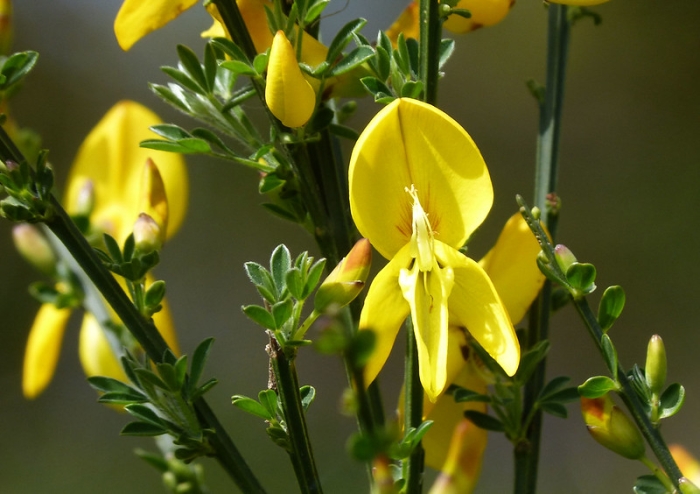Scotch Broom
(Cytisus scoparius)
Scotch Broom (Cytisus scoparius)
/
/

gailhampshire
CC BY 2.0
Image By:
gailhampshire
Recorded By:
Copyright:
CC BY 2.0
Copyright Notice:
Photo by: gailhampshire | License Type: CC BY 2.0 | License URL: https://creativecommons.org/licenses/by/2.0/ | Uploader: gailhampshire | Publisher: Flickr |
































































































Estimated Native Range
Summary
Cytisus scoparius, commonly known as Scotch Broom, is an evergreen or semi-deciduous shrub native to open woodlands and grasslands across Western and Central Europe. It typically grows to 1–3 m (3.3–9.8 ft) tall, with some specimens reaching up to 4 m (13 ft). The plant is characterized by its bright yellow pea-like flowers that bloom profusely in late spring to early summer, offering a showy display that is attractive to pollinators. The green stems are angled with small leaves, and the bark is generally hidden by foliage. The seed pods are notable for their hairy seams and their tendency to burst open in late summer, scattering seeds with a crackling sound.
Scotch Broom is valued for its vibrant flowers and low maintenance requirements, making it a popular choice for ornamental plantings, erosion control, and as a pioneer species for land reclamation. It thrives in full sun and can tolerate a range of soil conditions, from poor to moderately fertile, with varying drainage capabilities. However, it is drought-tolerant and generally requires little water once established. Cultivars like "Moonlight," "Andreanus," and "Firefly" offer variations in flower color, while "Pendula" features weeping branches. Gardeners should be cautious as C. scoparius can become invasive outside its native range due to its aggressive seeding and adaptability to various climates. It is also important to note that all parts of the plant contain toxic alkaloids that can affect the heart and nervous system if ingested.CC BY-SA 4.0
Scotch Broom is valued for its vibrant flowers and low maintenance requirements, making it a popular choice for ornamental plantings, erosion control, and as a pioneer species for land reclamation. It thrives in full sun and can tolerate a range of soil conditions, from poor to moderately fertile, with varying drainage capabilities. However, it is drought-tolerant and generally requires little water once established. Cultivars like "Moonlight," "Andreanus," and "Firefly" offer variations in flower color, while "Pendula" features weeping branches. Gardeners should be cautious as C. scoparius can become invasive outside its native range due to its aggressive seeding and adaptability to various climates. It is also important to note that all parts of the plant contain toxic alkaloids that can affect the heart and nervous system if ingested.CC BY-SA 4.0
Plant Description
- Plant Type: Shrub
- Height: 3-10 feet
- Width: 4-8 feet
- Growth Rate: Rapid
- Flower Color: Yellow
- Flowering Season: Spring
- Leaf Retention: Deciduous, Evergreen
Growth Requirements
- Sun: Full Sun
- Water: Low
- Drainage: Fast, Medium
Common Uses
Bank Stabilization, Border Plant, Deer Resistant, Drought Tolerant, Erosion Control, Fragrant, Rabbit Resistant, Salt Tolerant, Showy Flowers
Natural Habitat
Open woodlands and grasslands across Western and Central Europe
Other Names
Common Names: Common Broom, Scots Broom, Yellow Broom, English Broom, Scotchbroom, European Broom, Irish Broom, Broomtops, Scottish Broom, Scot’s Broom
Scientific Names: , Cytisus scoparius, Sarothamnus scoparius, Cytiscus scoparius, Cytisus scoparius var. scoparius, Sarothamnus scoparius subsp. scoparius, Genista scoparia, Sarothamnus vulgaris, Corema scoparium, Cytisogenista scoparia
GBIF Accepted Name: Cytisus scoparius (L.) Link